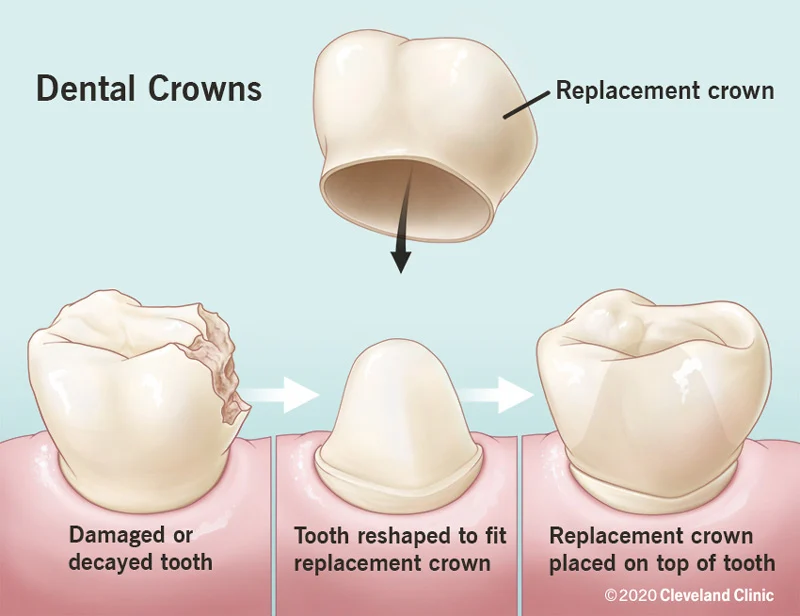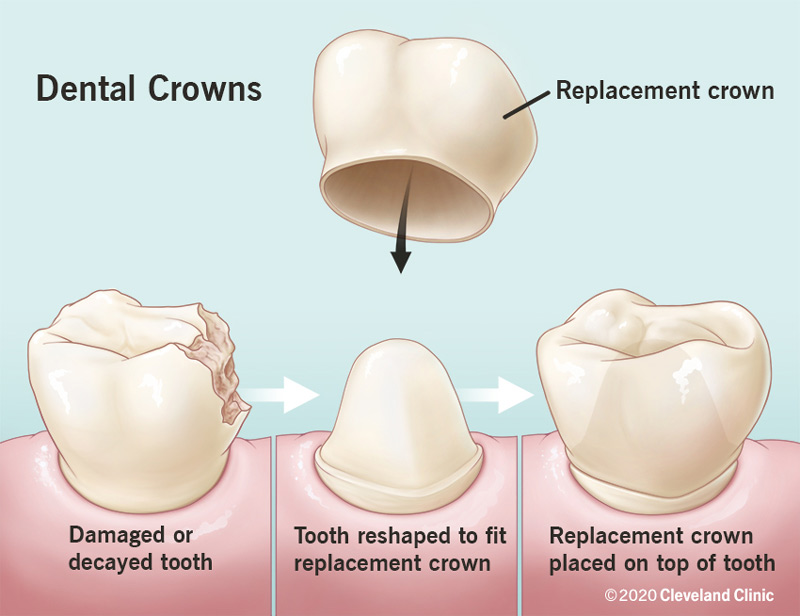
Dental crowns serve as protective caps that restore damaged or decayed teeth, enhancing their strength, shape, and appearance. People opt for dental crowns to protect weak teeth, mend broken ones, cover dental implants, or support dental bridges. They can also be used for cosmetic purposes, improving the look of discolored or misshapen teeth. Dental crowns provide a durable, long-lasting solution to various dental issues, helping individuals regain both oral health and confidence.
Why Do People Get Dental Crowns?
Dental crowns are a common dental restoration that can help restore the appearance and function of a damaged tooth. But why do people get dental crowns in the first place? There are several reasons why individuals may need a dental crown, ranging from cosmetic to functional purposes.
Restoring a Damaged Tooth
Dental crowns are often used to restore damaged teeth by covering and protecting them. They provide protection and support for teeth with significant decay, fractures, or chips, preventing further damage and potential tooth loss. Crowns serve as protective caps that strengthen compromised teeth, enabling comfortable chewing and speaking.
The Benefits of Dental Crowns for Restoring Damaged Teeth
Benefits of getting a dental crown to restore a damaged tooth:
- Improved Appearance: Dental crowns are designed to match the color and shape of surrounding teeth, enhancing the tooth’s appearance for a natural-looking smile.
- Durability and Longevity: With proper care, dental crowns can last for many years, providing a reliable solution that allows individuals to enjoy their favorite foods and beverages without fear of further damage.
- Prevention of Tooth Sensitivity: Damaged teeth can become sensitive to hot or cold temperatures. Crowns act as protective barriers, reducing sensitivity and discomfort, ensuring greater comfort while eating and drinking.
Protecting a Weak Tooth
- Dental crowns serve not only to restore damaged teeth but also to protect weakened ones.
- Weakened teeth can result from extensive dental procedures like large fillings or root canals.
- Dental crowns offer added strength and support to prevent further damage in such cases.
- Weak teeth are vulnerable to fractures, especially when chewing hard foods.
- Crowns act as protective shields, distributing forces evenly and safeguarding teeth from potential damage.
The Benefits of Dental Crowns for Protecting Weak Teeth
Protecting weak teeth with dental crowns offers several benefits:
- Enhanced Stability and Strength: Dental crowns provide stability and strength to weakened teeth, reducing the risk of further damage. This allows for comfortable eating and drinking without worrying about tooth breakage or increased fragility.
- Improved Bite Alignment: Weak teeth can lead to misalignment in the bite, causing discomfort and difficulty in chewing. Dental crowns restore the proper shape and size of the tooth, promoting normal bite function and alignment.
- Enhanced Smile Aesthetics: Weak teeth can appear worn or discolored, negatively impacting the smile’s appearance. Dental crowns cover weak teeth, delivering a natural and aesthetically pleasing result, improving overall smile aesthetics.
Supporting a Dental Bridge
- Support for Dental Bridges: Dental crowns are often used to support dental bridges.
- Prosthetic Solution: Dental bridges are prosthetic devices designed to replace missing teeth.
- Anchoring with Crowns: Crowns are placed on healthy adjacent teeth to securely anchor the dental bridge.
- Stability and Support: Crowns provide stability and support to ensure the dental bridge functions effectively.
- Completing the Smile: Dental bridges, with the help of crowns, fill in gaps left by missing teeth, allowing individuals to maintain a functional and complete smile.
The Benefits of Dental Crowns for Supporting Dental Bridges
When it comes to supporting dental bridges, dental crowns offer several advantages:
- Secure Foundation: Dental crowns provide a stable base for the bridge, ensuring it doesn’t shift during eating or speaking, enhancing comfort and functionality.
- Maintain Tooth Alignment: Dental crowns on healthy teeth adjacent to the gap prevent neighboring teeth from shifting or tilting. This preserves proper bite alignment and the natural appearance of the smile.
- Enhanced Aesthetics: Supporting a dental bridge with dental crowns fills in gaps left by missing teeth, improving the overall appearance of the smile and boosting self-confidence.
Dental crowns serve diverse purposes, from restoring and protecting teeth to supporting bridges. They bring benefits like better aesthetics, enhanced functionality, and increased durability. Consult a dentist for issues that can be resolved with a crown to restore your smile and oral health.
Key Takeaways: Why Do People Get Dental Crowns?
- Dental crowns are used to protect weak or damaged teeth.
- They can restore the shape and size of a tooth.
- Crowns can improve the appearance of a tooth by covering stains or discoloration.
- They can also support dental bridges or cover dental implants.
- Crowns can help prevent further damage to a tooth and improve oral health.
Frequently Asked Questions
When it comes to dental care, many people wonder why others may need dental crowns. Dental crowns are a common treatment option for various dental issues. Here are some frequently asked questions about why people get dental crowns:
1. What is a dental crown?
A dental crown is a custom cap placed on a damaged tooth to restore its shape, strength, and appearance. Made from materials like porcelain, they protect and support teeth affected by decay, cracks, or discoloration.
2. Why do people get dental crowns after root canal treatment?
- Post-Root Canal Weakness: Following root canal treatment, teeth can become fragile and susceptible to fracture due to the removal of the tooth’s internal pulp. This vulnerability necessitates the use of dental crowns.
- Protective Barrier: Dental crowns serve as a protective shield, preventing the reentry of bacteria into the treated tooth, which could lead to reinfection and further complications.
- Structural Support: Crowns offer structural reinforcement to the weakened tooth, enabling individuals to bite and chew comfortably without experiencing discomfort or compromising oral function.
- Preservation of Alignment: Dental crowns contribute to maintaining proper alignment of adjacent teeth. When a tooth is compromised or missing, crowns prevent shifting or misalignment, preserving the overall harmony of the bite and smile.
In summary, dental crowns are a crucial component in post-root canal care, offering protection, strength, and stability to ensure the long-term health and functionality of treated teeth.
3. Can dental crowns fix cracked or broken teeth?
Dental crowns effectively address cracked or broken teeth by holding them together, preventing further damage, and restoring strength. They may be combined with other treatments for comprehensive tooth restoration, depending on the extent of damage. Consult your dentist for a personalized treatment plan.
4. Are dental crowns used for cosmetic purposes?
Dental crowns, typically used for restorative purposes, can also enhance your smile’s appearance. Custom-made to match natural teeth in color and shape, they cover discoloration or misshapen teeth, providing both functional and cosmetic benefits for a more attractive, confident smile.h.
5. How long do dental crowns last?
The lifespan of a dental crown varies based on factors like material, oral care, and biting forces, typically lasting 10 to 15 years. Prolong its durability by practicing good oral hygiene, avoiding hard objects, and attending regular dental check-ups for maintenance and repairs.
Dental Crown Procedure
Final Summary: Why Do People Get Dental Crowns?
Dental crowns offer a versatile solution for various dental problems, from enhancing a tooth’s appearance to restoring its functionality. They provide durability, longevity, and a natural look, with various materials available. Whether protecting a weakened tooth or post-root canal restoration, dental crowns offer an aesthetically pleasing and robust solution. Consulting a dentist is crucial to determine the suitability of a dental crown for your specific needs, as they can assess your oral health, address concerns, and guide you through the process. Embracing dental crowns can lead to a healthier, confident, and brighter smile, making them an excellent choice for dental restoration.
Call or Book appointment online
:Ace Dental Care Alpharetta office: 678-562-1555 - Book Now
Ace Dental Care Norcross office: 770-806-1255 - Book Now
Disclaimer
This blog post was generated by artificial intelligence. The content of this post may not be accurate or complete, and should not be relied upon as a substitute for professional advice. If you have any questions about the content of this post, please contact us.
We are constantly working to improve the accuracy and quality of our AI-generated content. However, there may still be errors or inaccuracies. We apologize for any inconvenience this may cause.






